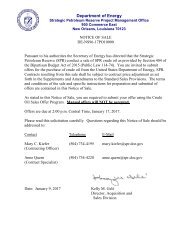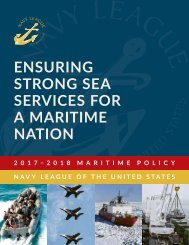2010-11_ANNUAL_REPORTS_-_FINAL_VERSION_(3)
2010-11_ANNUAL_REPORTS_-_FINAL_VERSION_(3)
2010-11_ANNUAL_REPORTS_-_FINAL_VERSION_(3)
You also want an ePaper? Increase the reach of your titles
YUMPU automatically turns print PDFs into web optimized ePapers that Google loves.
short-haul truck and rail operators. The M-64 service between Hampton Roads and Richmond, VA has<br />
demonstrated how state, Federal, local, and private partners can develop and grow marine highway<br />
services by leveraging minimal resources from several different entities. Cargo volumes on the service<br />
have grown by over 400% since its inauguration due to the marketing efforts of the Virginia Port<br />
Authority, increased service frequency, tax incentives provided by the State of Virginia, and a complete<br />
logistics package created by the service provider. The Ports of Brownsville and Manatee are in the final<br />
stages of negotiating a new agreement with a Jones Act carrier to re-establish the M-10 marine highway<br />
service between those two ports. The modification and construction of new barges needed to support<br />
and expand these services will be performed in U.S. shipyards. Finally, the Department also funded<br />
three feasibility studies totaling $800,000 for potential intermodal marine highway services along the U.<br />
S. West Coast, East Coast and the inland rivers.<br />
Formalizing the Marine Highway Program through designations and funding encourages other<br />
government and private sector stakeholders to incorporate marine highways into their logistics planning.<br />
Further, these designations bring together planners from different jurisdictions to explore ways to reduce<br />
freight congestion and related impacts on the environment.<br />
Throughout FY 20<strong>11</strong>, the agency continued to focus on developing innovative partnerships between<br />
State, Federal, local, and private partners to make these projects successful and sustainable. This has<br />
included leveraging state and local incentives to incentivize shippers to utilize those services, and<br />
reaching out to domestic and international stakeholders. Strengthening partnerships between State<br />
departments of transportation, carriers, metropolitan planning organizations, ports, foreign governments,<br />
and others will bring greater efficiency and overall success to the expanded use of marine highways<br />
within the Nation’s transportation system.<br />
Domestically, MARAD conducted corridor workshops in San Francisco, CA and New York, NY<br />
focusing on identifying barriers and targeting markets with the greatest potential for success of a marine<br />
highway system along the M-5 and M-95 corridors. We continued this dialogue at the first America’s<br />
Marine Highways regional roundtable, held in Brownsville, TX, on April 26, 20<strong>11</strong>, where we worked<br />
with representatives from five Gulf Coast States and Mexico to build a local coalition interested in<br />
adding efficient, environmentally-sustainable capacity to the congested I-10 freight corridor.<br />
Internationally, MARAD reached out through the North American Short Sea Shipping Steering<br />
Committee. In 20<strong>11</strong>, the committee adopted a strategy to identify congested border crossings and to<br />
promote marine highway services as a solution. We also engaged our European counterparts, resulting<br />
in a Memorandum of Cooperation (MOC) signed with the European Union’s Ministry of Transport on<br />
July 1, 20<strong>11</strong>. The initial follow-up workshop, held in November 20<strong>11</strong>, provided an opportunity to<br />
exchange information, ideas, best practices, ways to integrate intelligent transportation technologies,<br />
success stories, and views on short sea shipping objectives and policies. The workshop also provided an<br />
opportunity to share information and concerns on the development of marine highway services and the<br />
potential for LNG technology to change the operational cost structure for services.<br />
Along with these efforts, MARAD’s Office of Marine Highways and Passenger Services continues to<br />
encourage service development and creative solutions to barriers as they are identified.<br />
America’s Ports<br />
National Port Summit<br />
On February 4-5, <strong>2010</strong>, DOT hosted the first National Port Summit in San Diego, CA, where more than<br />
150 port directors and staff participated in a two-day conference, culminating in a town hall-style meeting<br />
with Transportation Secretary LaHood. The summit recommended that DOT develop a national port and<br />
freight strategy to integrate the Nation’s port system into the overall transportation system, remove<br />
impediments to the development of marine highways, and establish the Secretary’s Port Advisory Council.<br />
13




